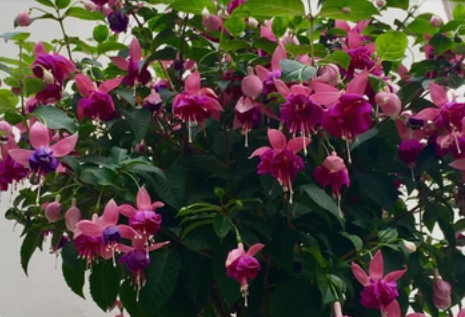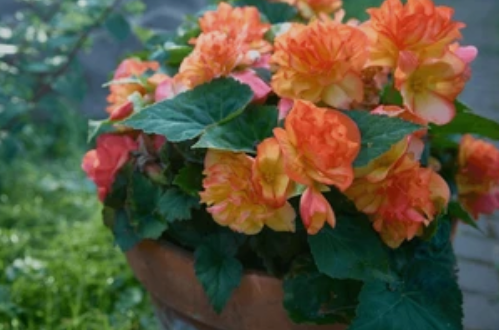Did you know that over 65% of American homeowners love hanging baskets for their porch and patio?
These plants add color and beauty to even the shadiest spots.
You’re in the right spot if you’re looking for the perfect plants for your shaded porch.
This post will show you the top shade-loving hanging basket plants and discuss the best conditions for their growth.
Plus, we’ll share tips to keep your plants looking great all season.
Whether you’re an experienced gardener or just starting, you will learn how to create a beautiful shaded oasis on your porch.

The Perfect Environment for Hanging Basket Plants
To grow lush and vibrant hanging basket plants, knowing the right environment is key.
Light, soil, and temperature are all important. Each one helps your plants stay healthy and live longer.
Light Requirements for Shade-Loving Plants
Hanging basket plants for indoors do best in partial shade.
They can handle lower light and even thrive in it. This makes them great for shaded spots like porches and patios.
Optimal Temperature and Humidity Conditions
Hanging basket plants like it cool and a bit moist.
Keep daytime temperatures between 65-75°F (18-24°C).
At night, they should not get colder than 55°F (13°C).
Keep humidity at 40-60% to match their natural habitat.
Soil and Drainage Considerations
The soil mix is crucial for your hanging basket plants.
Choose a mix that drains well and is full of nutrients.
Good drainage prevents waterlogged soil, which can harm your plants.
| Environmental Factor | Ideal Conditions for Hanging Basket Plants |
|---|---|
| Light | Partial shade or filtered light |
| Temperature | Daytime: 65-75°F (18-24°C) Nighttime: No lower than 55°F (13°C) |
| Humidity | 40-60% |
| Soil | Well-draining, nutrient-rich potting mix |
Best Flowering Shade Hanging Basket Plants
Creating a stunning shaded porch or balcony is easier with the right plants.
These vibrant, shade-loving options add elegance and thrive in soft light.
Let’s look at some top flowering shade hanging basket plants for your home.
1) Fuchsias

Fuchsias are a favorite for hanging baskets.
They have cascading blooms in many colors, from bold reds to delicate pinks.
These plants love shade and are perfect for covered spaces.
2) Begonias

Begonias are great for shade hanging baskets.
They have large, vibrant flowers and interesting leaves.
Look for wax or tuberous begonias for hanging baskets.
3) Impatiens

Impatiens are known for their bright blooms. They thrive in shade and come in many colors. They’re a great way to add color to your porch.
Fuchsias, Begonias, and Impatiens
| Plant | Light Needs | Bloom Colors | Growth Habit |
|---|---|---|---|
| Fuchsias | Partial to full shade | Red, purple, pink, white | Cascading, trailing |
| Begonias | Partial to full shade | Red, pink, white, yellow | Mounding, trailing |
| Impatiens | Partial to full shade | Red, pink, white, orange | Mounding, cascading |
These plants can turn your shaded porch or balcony into a vibrant oasis.
Choose the right plants and care for them well.
You will create a stunning display that will impress everyone.
Trailing Foliage Plants for Shaded Porches
Trailing foliage plants are essential for a lush look on your shaded porch.
They cascade beautifully, adding depth and interest.
These plants love shade and provide greenery all year.
Vining Plant Options
English ivy and Swedish ivy are great for hanging baskets.
They spill over the basket edges, creating a lush look.
Their growth is perfect for shaded areas, adding elegance to your porch.
Cascading Leaf Varieties
Fuchsia and bacopa add a delicate touch to your baskets.
Their dainty leaves cascade down, giving a romantic feel. Their growth pattern fits well in shaded areas.
Year-Round Greenery Choices
English ivy and Swedish ivy are great for year-round interest.
They stay green all seasons, making your baskets look good even in winter.
They’re perfect for a long-lasting porch display.
Maintaining Your Shade Hanging Basket Plants

Keeping your shade hanging basket plants healthy needs some care.
We will cover watering, pruning, and more to keep your baskets looking great.
Watering Needs
Shade plants in hanging baskets need more water than sun plants. Check the soil daily. Water when the top inch feels dry.
Don’t let the soil dry out completely. This can stress your plants and cause them to wilt.
Pruning and Deadheading
Pruning and deadheading keep your baskets looking good.
Use sharp pruners to cut off dead or damaged leaves. This helps your plants focus on growing more flowers.
Fertilizing for Healthy Growth
Feed your plants with a balanced fertilizer every two to three weeks.
This gives them the nutrients they need to grow well. Always follow the fertilizer package’s instructions.
Cleaning and Maintenance
- Wipe leaves with a damp cloth to remove dust.
- Look for pests or diseases often and fix them quickly.
- Rotate the basket to ensure even growth and light.
If you keep up with these tasks, your shade hanging basket plants will thrive.
They will show off beautiful foliage and flowers all season long.
Seasonal Care and Protection Tips
Keeping your indoor hanging basket plants healthy all year needs a smart plan.
This includes protecting them from winter cold and helping them survive the summer heat.
We well show you how to keep your plants looking great, no matter the season.
Winter Protection Strategies
When it gets cold, your plants might need extra care to avoid frost and wind damage.
Move them to a safe spot, like a covered porch or garage, during the coldest months.
If they can’t be moved, wrap the baskets with burlap or fleece to keep them warm.
Summer Heat Management
The hot summer sun can be tough on your plants. Make sure to water them often, as the soil in hanging baskets dries out fast.
Also, place them in some afternoon shade or use a shade cloth to block the strong sun.
Seasonal Transitions
Changing your plants’ environment between seasons needs care.
When moving them, start by placing them in a shaded area for a few days. This helps them adjust to the new light or temperature.
This way, your plants will stay healthy and colorful all year.
Creative Arrangement Ideas for Multiple Baskets

Decorating a shaded porch with hanging basket plants opens up endless possibilities.
Arranging multiple baskets can make your outdoor space look stunning.
You can use a variety of shade-loving plants or trailing foliage to create a beautiful display.
Playing with different heights is a great idea. Hang taller baskets at eye level or above.
Place smaller or cascading varieties below. This creates a layered effect that adds depth and dimension to your porch.
Grouping baskets of varying sizes and shapes together can also be dynamic.
It creates an asymmetrical arrangement that catches the eye.
This adds visual interest to your porch.
Mixing different plant types and colors can make your display stand out.
Pairing complementary hues like purple and yellow or pink and white can look great.
Combining different textures, like begonias with ivy or fuchsia, adds depth.
Don’t be afraid to mix and match basket materials, shapes, and styles.
Metal, wicker, or macramé baskets can add unique interest.
Try different sizes, from small wall-mounted to large statement-making designs.
By carefully arranging your shade hanging basket plants, you can turn your porch into a lush oasis.
Whether you choose a symmetrical or eclectic arrangement, the most important thing is to have fun and let your creativity shine.
Common Problems and Solutions for Shade Plants
Keeping shade hanging basket plants healthy can be tricky.
But, with the right steps, you can solve common issues.
This ensures your indoor or patio plants stay vibrant and beautiful.
Pest Management
Shade plants often attract pests like aphids, spider mites, and mealybugs.
Check your baskets often for pests. Use insecticidal soap or neem oil spray to get rid of them safely.
Good air flow and not overwatering also help prevent pests.
Disease Prevention
Diseases like powdery mildew, leaf spot, and root rot can harm shade plants.
Use well-draining soil and avoid wet soil. Good air flow and removing sick leaves help too.
If disease strikes, use a fungicide made for that problem.
Troubles Growth Issues
Struggling plants might need better light, nutrients, or care.
Watch your plants closely and adjust as needed. Change light levels, use balanced fertilizer, and keep moisture right.
By tackling common problems, your shade plants will flourish. They’ll add beauty to your space, indoors or outdoors.
Watering and Fertilizing Guidelines
Keeping your shade hanging basket plants healthy is key.
They need the right amount of water and nutrients to grow well. This ensures they bloom brightly all season.
Watering Needs for Shade Loving Plants
Shade plants need more water than sun-loving ones.
Shaded areas are cooler and drier, so plants dry out slower.
But, don’t let the soil get too wet.
Water when the top inch of soil feels dry. This keeps the soil just right, not too wet or dry.
Fertilizing for Lush Growth
For lush growth and lots of blooms, use a balanced fertilizer.
Apply it every two to three weeks, as the label says.
This gives your plants the nutrients they need in the shade.
Adjusting for Seasonal Changes
Seasonal changes mean you might need to adjust how often you water and fertilize.
In cooler months, plants need less.
But in warmer weather, they need more care.
Watch your plants closely and change your routine as needed.
This keeps them healthy and looking great all year.

Nonetheless, following these tips, you can make your shade hanging basket plants thrive.
They will add beauty to your outdoor space all season.
Design Tips for Creating Stunning Hanging Displays
Creating a beautiful outdoor space with hanging baskets is simple.
Learn about color mixing, basket placement, and plant combinations.
This will turn your porch or balcony into a lush, stunning area.
Color Combination Strategies
Colors can make your hanging basket display pop.
Try pairing colors like bright fuchsias with soft lavender.
Or, mix trailing ivy with yellow marigolds for a lively look.
For a sleek look, use different shades of the same color.
Basket Placement Tips
Where you place your baskets matters a lot.
Try different heights to add depth. Hang tall baskets at eye level or above.
Place smaller ones below for a layered look.
Positioning baskets along the railing or from above can make your space look better.
Mixed Planting Techniques
Using different plants in one basket can make it more interesting.
Mix trailing plants with upright ones for a lively display.
Try different textures and colors to make your basket stand out.
Related Post: 22 hanging basket plants for living room
FAQ
What are the best flowering shade hanging basket plants?
For vibrant blooms, try fuchsias, begonias, impatiens, and trailing geraniums. These plants love partial shade and bloom all season.
What are good trailing foliage plants for shaded porches?
English ivy, Swedish ivy, and creeping jenny are great for shaded baskets. They cascade beautifully. Wandering jew and ferns also add lush greenery.
How do I care for my shade hanging basket plants?
Water them regularly and fertilize every 2-4 weeks with a balanced liquid fertilizer. Prune to keep their shape. Watch for pests and diseases and fix them fast.
How can I protect my shade hanging basket plants in different seasons?
In winter, move baskets to a sheltered spot or bring them inside. In summer, use dappled shade to avoid sunburn.
How can I create visually stunning hanging basket displays?
Mix plant heights, textures, and colors for stunning displays. Use cascading, upright, and trailing plants. Place baskets at different levels for depth and dimension.





